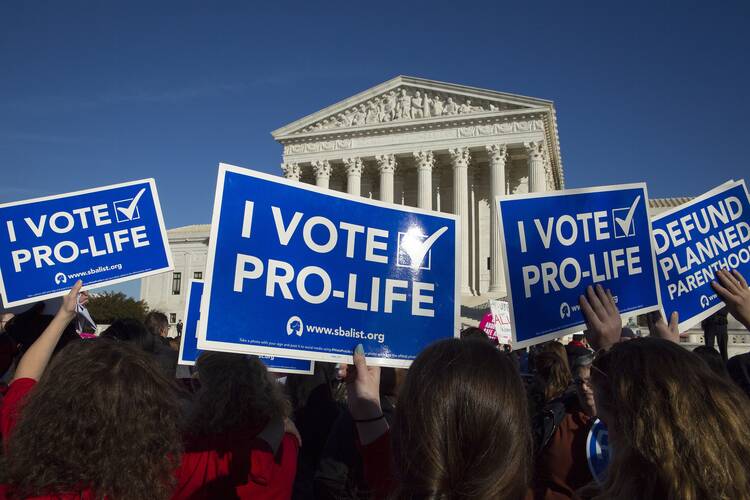[Editors’ note: See also “Explainer: If Donald Trump wins, what does that mean for abortion policies?”]
Update (Oct.6): Asked during an NBC town hall on Oct. 5 what he would do if Roe v. Wade were overturned, Democratic presidential candidate Joe Biden said he would make the nationwide right to abortion guaranteed by that landmark ruling “the law of the land.”
The question came as Amy Coney Barrett, President Trump’s nominee to fill the seat left vacant by Justice Ruth Bader Ginsburg, makes her way through the confirmation process. Mr. Trump has made naming conservative judges a central plank of his reelection platform, and religious and conservative advocates are hopeful that Ms. Barrett would be a reliable vote against Roe.
[Related: Explainer: Amy Coney Barrett’s relationship with People of Praise]
If the decision were overruled by the Supreme Court, would a President Biden have the authority to make Roe the “law of the land”? If Roe were struck down or severely weakened by the court, individual states would once again be able to legislate abortion policy. But what would a Democratic win mean for abortion policy on the national level?
This is not just a matter of concern for Catholics (Mr. Biden is a practicing Catholic, and his running Senator Kamala Harris is a Baptist), as the abortion question remains a neuralgic issue across political and religious lines, to the extent that politicians on both sides of the question have regularly tried to use legalized abortion as a wedge issue to sway conflicted voters. Both Mr. Biden and President Trump are actively courting Catholic voters, with the Trump campaign often highlighting the president’s pro-life stance on abortion to woo the Catholic and white evangelical vote. Both Mr. Biden and Ms. Harris are publicly pro-choice, though Ms. Harris has a longer and more consistently permissive view on abortion policy than her running mate.
What would a Biden/Harris victory mean for pro-life and pro-choice concerns?
A 2019 NPR/PBS NewsHour/Marist Poll showed that a strong majority (almost 75 percent) of Americans want to keep Roe v. Wade as established law, but an almost equally strong majority (61 percent) want to see further restrictions on abortion rights. Both numbers suggest a strong divergence between the official stances of the two parties and the sentiments of their constituents.
What would a Biden/Harris victory mean for pro-life and pro-choice concerns?
Will Ms. Harris pull Mr. Biden leftward on abortion issues?
Unlikely. Mr. Biden’s position on abortion—that he is personally opposed to abortion but believes it should be legal in most cases—has remained fairly consistent over several decades. He has already made what is likely his last major shift, dropping support for the Hyde Amendment, which bans federal funding for abortion. Mr. Biden announced he no longer supported the longstanding amendment in 2019. Even on a political basis alone, it seems like a lose-lose proposition for Mr. Biden. Polls have shown that more than 60 percent of Americans favor the Hyde Amendment.
Mr. Biden’s other probable legislative move on abortion—canceling the Mexico City policy, which forbids federal funding to foreign groups that provide abortions—is already a given, as the policy has been a Ping-Pong ball in American politics for decades. Implemented by President Ronald Reagan in 1984, it was revoked by President Bill Clinton in 1993, reinstated by President George W. Bush in 2001, revoked by President Barack Obama in 2009 and reinstated by President Trump in 2017. Mr. Biden almost surely intends to cancel the policy once again if elected. The U.S. Conference of Catholic Bishops has consistently supported the Mexico City policy.
Polls have shown that more than 60 percent of Americans favor the Hyde Amendment.
Will Mr. Biden pull Ms. Harris toward the center on abortion issues?
Also unlikely. Support for legal abortion has become all but a litmus test for Democratic candidates for office, to the dismay of the U.S.C.C.B. and pro-life activists within the party. Ms. Harris never felt the need to appeal to pro-life voters to win elections in California, and Democratic efforts to court the white evangelical vote are more likely to center on economic questions and Mr. Trump’s handling of the Covid-19 crisis. Given Mr. Biden’s age, it is less likely that he will seek a second term if elected—giving Ms. Harris all the more reason to prove her bona fides to the pro-choice platform of the Democratic Party.
Thomas J. Reese, S.J.: "For too many Democratic activists, abortion has become a litmus test of Democratic orthodoxy."
What about the Supreme Court?
Presidential candidates on both sides of the abortion issue have long sought to use the question of whom they would appoint to the Supreme Court as a political rallying point (hence Mr. Trump’s 2012 reversal of his previous pro-choice stance). But appointing Supreme Court justices on the basis of their stance on abortion has proved a notoriously tricky enterprise over the last 45 years. Despite Mr. Trump’s appointments of Justices Brett Kavanaugh and Neil Gorsuch to the bench, little has yet changed in the national abortion debate or in the realities of legalized abortion. This is partly because of the length of time it takes for the Supreme Court to hear arguments, but also because of the wide-ranging nature of the issues the Supreme Court deals with. It would be folly to argue that any justice is a “one issue” voter.
It is also worth noting that justices can reveal unexpected judicial opinions after appointment: The liberal lion Justice Harry Blackmun was appointed by President Richard Nixon; similarly, Justice Anthony Kennedy (author of the 2015 Obergefell decision striking down laws against same-sex marriage nationwide) was appointed by President Ronald Reagan, and Justice David Souter was nominated by President George Bush. All three drifted considerably to the left of their expected judicial profiles during their career. Further, in the last significant challenge to Roe v. Wade—Casey v. Planned Parenthood, in 1992—three justices appointed by Republican presidents (Sandra Day O’Connor, Anthony Kennedy and David Souter) co-authored the plurality opinion upholding the “essential holding” of Roe v. Wade—to the dismay of the pro-life movement.
There are fewer recent examples of justices becoming unexpectedly conservative, but Justice Hugo L. Black, appointed by President Franklin D. Roosevelt as a champion of labor rights, became part of the conservative bloc when Chief Justice Earl Warren led the court in an expansion of free-speech rights and protections for criminal defendants. Similarly, Justice Felix Frankfurter, who was believed to be a reliably left-of-center jurist when appointed by Mr. Roosevelt in 1938, came to be considered, by the time he retired in 1962, one of the court’s conservative stalwarts.
Appointing Supreme Court justices on the basis of their stance on abortion has proved a notoriously tricky enterprise over the last 45 years.
Who decides if abortion is legal?
The fact remains that the U.S. Supreme Court is not the only arbiter of abortion law. If Roe v. Wade is overturned, the issue would be kicked back to individual states, which would largely have to formulate policy through the legislative process rather than through appeals to the courts. (See “Roe v. Wade has made abortion politics impossible. It needs to be challenged.”) The result would likely be a checkerboard of states with varying restrictions, or almost no restrictions at all, on abortion. State governors and legislators also may not behave as expected: Few remember that the governor who legalized abortion in California in 1967 was Ronald Reagan; according to National Review, abortions in California increased from 518 that year to an annual average of 100,000 for the rest of his two terms as governor, the highest number in the United States during those years before Roe v. Wade.
Will the number of abortions increase or decrease in a Biden/Harris presidency?
People who prioritize abortion in their voting decisions on either side are not thinking solely about the total number of abortions. For most pro-lifers, if abortion is the direct killing of an innocent being, it is gravely unjust no matter the number; for most pro-choice advocates, the bodily autonomy of women demands that the right to choose an abortion be protected at all costs. However, as E. J. Dionne noted almost three decades ago in Why Americans Hate Politics, many voters in the United States are eminently practical when it comes to actual legislation and are more results-oriented than ideological.
In reality, abortion rates and the absolute number of abortions have both fallen consistently for the past decade and are now at their lowest level since the Roe v. Wade decision in 1973—but the reason is probably not the restrictions on abortions implemented in many individual states. Rather, economic forces are often the primary driver of abortion rates. The higher the poverty rate, the more abortions increase. Second, in an awkward reality for some pro-lifers who also oppose contraception, another possible factor in the declining number of abortions is a noticeable drop in the number of pregnancies in the United States, in part due to contraceptive coverage offered through the Affordable Care Act.
Abortion rates and the absolute number of abortions have both fallen consistently for the past decade and are now at their lowest level since the Roe v. Wade decision in 1973.
Will abortion politics sway the Catholic vote?
Probably not, with some caveats. Studies by the Guttmacher Institute in 2018 and the Pew Research Center in 2014 showed that Catholic women have abortions at almost the same rate as the general population in the United States, and a 2019 study by the Pew Research Center showed that Catholic opinions on the legality of abortion tend to mirror those of white mainline Protestants. (White evangelical Protestants remain heavily opposed to legal abortion in most cases.) The exception is Catholics who report attending Mass regularly, where the percentage of those who believe abortion to be “morally wrong” shoots up to 83 percent.
On the other hand, the Democratic Party’s insistence on a party platform supporting almost unlimited access to abortion can affect local races—and votes in local races can influence voting preferences in the presidential race. “For too many Democratic activists, abortion has become a litmus test of Democratic orthodoxy,” wrote Thomas J. Reese, S.J., in 2020. “There is no room for a Democratic candidate who is anti-abortion for office at any level, even if the alternative is a Republican win.” With the U.S.C.C.B. consistently stating that combating abortion is a “pre-eminent priority,” Mr. Biden and Ms. Harris run the risk of alienating many Catholic voters who support other aspects of their platform.
The apparent divide between Catholic teaching on abortion and the beliefs of Catholics is mirrored by similar contradictions in the two major political parties. A 2019 Gallup poll showed that 21 percent of Republicans considered themselves pro-choice, while 29 percent of Democrats considered themselves pro-life.










